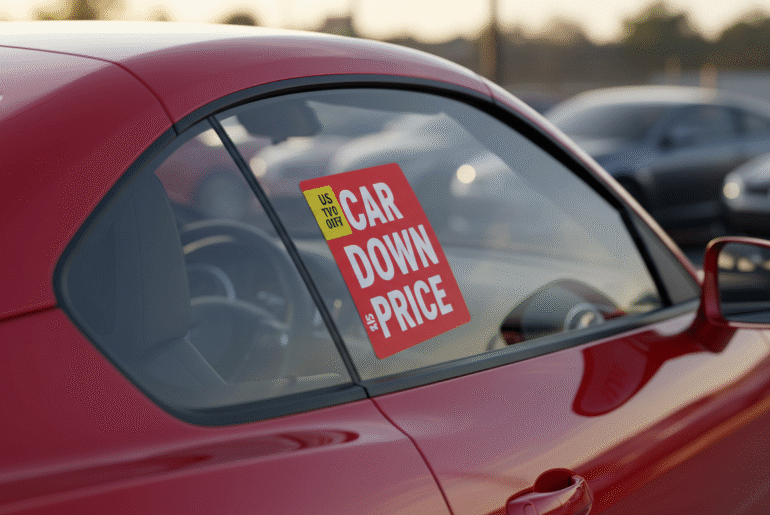This article may contain references to products or services from one or more of our advertisers or partners. We may receive compensation when you click on links to those products or services. Nonetheless, our opinions are our own.
The information presented in this article is accurate to the best of our knowledge at the time of publication. However, information is subject to change, and no guarantees are made about the continued accuracy or completeness of this content after its publication date.
- How Much to Spend on a Car
- Finding Your Monthly Budget
- Needs Versus Wants
- Other Costs to Think About
- Financing a Car
- Thinking About Resale Value
- New vs. Used
- Check Your Big Picture Finances
- Frequently Asked Questions
- What factors should I consider when setting a budget for a car?
- How much should I allocate for a down payment?
- What is the typical car payment I can afford?
- Should I consider financing options?
- What other expenses should I factor into my budget?
- Is it better to buy new or used when working with a budget?
- How can I avoid overspending on a car?
- Summary of Spending Wisely on Your First Car
- Recommended Reads
How Much to Spend on a Car
Buying your first car is an exciting milestone but it can also be overwhelming. With endless models, pricing options, and financing terms to consider, it’s easy to overspend or make a rushed decision. Understanding how to budget for a car that aligns with both your financial reality and lifestyle needs can help you make a confident, informed choice. This guide will walk you through key budgeting strategies and ownership considerations to ensure your first car is a wise investment.
Finding Your Monthly Budget
Start with a budgeting rule of thumb: your car payment should be no more than 15% of your monthly take-home pay. For example, if your net income is $3,000 per month, aim to keep your car payment around $450. This ensures you leave room for other financial priorities, such as savings, rent, and discretionary spending.
For more conservative budgeting, aim for 10% or less of your take-home pay. The goal is to balance affordability with long-term financial stability.
Needs Versus Wants
Before visiting a dealership or browsing online listings, make a clear distinction between what you need in a car and what you want. This clarity will help you avoid impulsive upgrades and stay focused on your budget.
- Needs: reliability, safety features, good fuel economy, manageable size for city driving or parking
- Wants: premium audio systems, leather interiors, heated seats, sunroofs, custom trims
Prioritize your needs first, especially if your budget is tight. You can always explore upgrades later when your financial situation improves.
Other Costs to Think About
The sticker price is just the beginning. Owning a car comes with ongoing costs that should be factored into your budget:
- Down payment: A down payment of at least 20% reduces your loan balance, monthly payment, and total interest paid.
- Insurance: Premiums vary based on age, location, driving history, and vehicle type. Get quotes before committing.
- Maintenance and repairs: Older cars may need more frequent repairs. Budget for oil changes, brakes, tires, and unexpected issues.
- Registration and taxes: These depend on your state and vehicle value. Be sure to check local fees ahead of time.
- Fuel costs: Compare fuel efficiency and determine whether the car requires regular or premium gasoline.
Voted "Best Overall Budgeting App" by Forbes and WSJ
Monarch Money helps you budget, track spending, set goals, and plan your financial future—all in one app.
Get 50% OFF your first year with code MONARCHVIP
Financing a Car
If you’re planning to finance your vehicle, consider these key factors:
- Check your credit score to determine your loan eligibility and interest rate options.
- Choose the shortest loan term you can afford; shorter terms reduce the total interest paid.
- Be sure your employment and income are stable before committing to long-term financing.
Alternatively, paying with cash can save you from interest charges altogether but make sure doing so won’t deplete your emergency fund or other savings.
Thinking About Resale Value
All vehicles depreciate, but some retain their value better than others. Brands like Toyota and Honda are known for strong resale performance. Research resale values and depreciation rates to make a smarter investment, especially if you plan to sell or trade in the car within five years.
New vs. Used
Each option has benefits and trade-offs:
- New cars: Offer warranties, modern features, and low maintenance needs. However, they lose 20–30% of value within the first year.
- Used cars: Are more affordable and experience less depreciation. However, they may have higher maintenance costs and require careful inspection.
When buying used, always request a vehicle history report and have a trusted mechanic perform an inspection before purchase.
Check Your Big Picture Finances
A car purchase should fit into your broader financial plan, not disrupt it. Before committing to a car payment, ask yourself:
- Do I have at least three to six months of emergency savings?
- Am I contributing to retirement or long-term savings goals?
- Will a car payment affect my ability to relocate, travel, or invest?
Buying a car should enhance your daily life, not become a financial burden.
Frequently Asked Questions
What factors should I consider when setting a budget for a car?
Start with your monthly income, fixed expenses, and financial goals. Consider the full cost of ownership, including insurance, fuel, maintenance, taxes, and loan payments. Your car budget should align with your overall spending plan and not hinder your ability to save or manage debt.
How much should I allocate for a down payment?
Ideally, set aside at least 20% of the vehicle’s purchase price. A larger down payment reduces your loan balance, lowers interest costs, and can improve your approval chances. For used vehicles, you may get away with slightly less, but 10% is a good starting point.
What is the typical car payment I can afford?
Keep your monthly payment below 15% of your net income. For added financial security, aim closer to 10%. This ensures you have enough flexibility for other expenses, such as emergency savings, rent, groceries, or entertainment.
Should I consider financing options?
Yes. Financing can make buying a car more accessible, but compare interest rates, terms, and fees from multiple lenders. Avoid loans longer than 60 months if possible, as extended terms increase the total cost and reduce equity in your vehicle over time.
What other expenses should I factor into my budget?
Beyond monthly payments, budget for fuel, insurance, maintenance, registration, and taxes. These hidden costs can significantly increase your total vehicle expenses. Use an ownership cost calculator to estimate monthly totals before finalizing your budget.
Is it better to buy new or used when working with a budget?
Used vehicles are generally more cost-effective and avoid early depreciation. However, new cars offer warranties and fewer repair concerns. Choose based on your financial comfort, desired features, and how long you plan to keep the vehicle.
How can I avoid overspending on a car?
Set a firm budget, research vehicles in your price range, and stick to your list of essential features. Avoid dealership upselling and be wary of extended warranties or add-ons you don’t need. Use online affordability calculators to double-check what’s realistic for your income.
Summary of Spending Wisely on Your First Car
There’s no universal dollar amount that fits every buyer, but smart budgeting principles can guide your decision. Stick to the 15% rule, focus on needs before wants, account for all ownership costs, and ensure your car purchase complements, not complicates, your financial goals. With research and planning, your first car can offer both freedom and peace of mind.

Reviewed and edited by Albert Fang.
See a typo or want to suggest an edit/revision to the content? Use the contact us form to provide feedback.
At FangWallet, we value editorial integrity and open collaboration in curating quality content for readers to enjoy. Much appreciated for the assist.
Did you like our article and find it insightful? We encourage sharing the article link with family and friends to benefit as well - better yet, sharing on social media. Thank you for the support! 🍉
Article Title: Smart Car Budgeting Tips for First-Time Buyers
https://fangwallet.com/2025/07/31/smart-car-budgeting-tips-for-first-time-buyers/The FangWallet Promise
FangWallet is an editorially independent resource - founded on breaking down challenging financial concepts for anyone to understand since 2014. While we adhere to editorial integrity, note that this post may contain references to products from our partners.
The FangWallet promise is always to have your best interest in mind and be transparent and honest about the financial picture.
Become an Insider

Subscribe to get a free daily budget planner printable to help get your money on track!
Make passive money the right way. No spam.
Editorial Disclaimer: The editorial content on this page is not provided by any of the companies mentioned. The opinions expressed here are the author's alone.
The content of this website is for informational purposes only and does not represent investment advice, or an offer or solicitation to buy or sell any security, investment, or product. Investors are encouraged to do their own due diligence, and, if necessary, consult professional advising before making any investment decisions. Investing involves a high degree of risk, and financial losses may occur including the potential loss of principal.
Source Citation References:
+ Inspo
There are no additional citations or references to note for this article at this time.












































